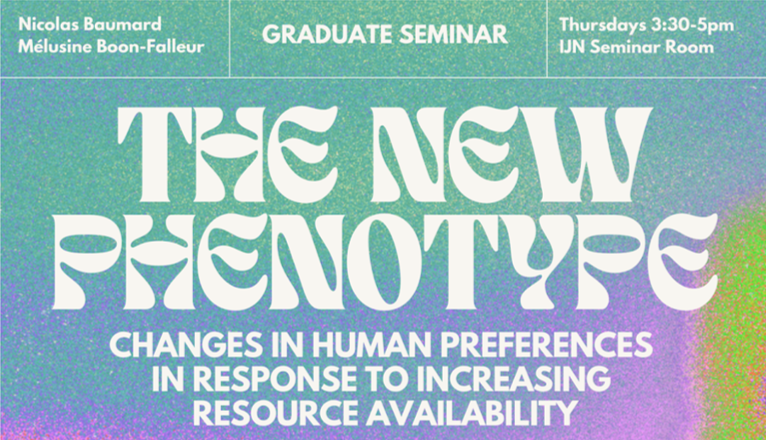Home > News > COURS ǀ Une nouvelle saison du séminaire "Evolutionary anthropology of the (...)
COURSES ǀ A new season for the seminar "Evolutionary anthropology of the future" by Nicolas Baumard and Mélusine Boon-Falleur

Evolutionary anthropology of the future
École Normale Supérieure, Département d’Etudes Cognitives
Nicolas Baumard and Mélusine Boon-Falleur
—
Humans are growing taller. Their body temperature, as well as testosterone levels in males is going down. Intelligence, as measured by IQ, has been increasing around the world. These are amongst the many changes that have been observed in human populations in the past century.
What is causing such changes ? It is needless to say that the environment in which modern humans are living is drastically different from the environment a century ago, let alone their ancestral environment. Among the many changes in the environment that have taken place in the last century, perhaps the most drastic one is the drastic increase in the amount of resources that people have access to. If we take energy as a measure of resource, humans have gone from consuming on average about 5,000 calories a day, to 30,000 calories a day in the most developed countries today.
This change in the environment is causing changes in the physiology and psychology of humans, through a mechanism called phenotypic plasticity. In the same way that people’s skin color changes with the amount of sun rays it has been exposed to, people’s behavior and preferences will change according to how much resource a person can access. In particular, when resources are higher and mortality lower, individuals tend to be more future-oriented, more exploratory, more trustful, but also less impulsive, less materialistic and less sexually active.
This seminar will explore the implications of this research for understanding the societal changes that are taking place today, and that await us in the 21th century.
This seminar is participative rather than a lecture. Students will be introduced to a new way of thinking about societal changes, but they will also engage in foresight and trend analysis. Here are some examples of questions we will explore :
- Will people stop having children ?
- Will people become more monogamous, or will polyamour become the norm ?
- Will people have more sex, or will they rather become asexual ?
- Are democracies going to overcome authoritarian regimes ?
- How will the workplace evolve ? What about higher education ?
- What will be the new moral norms ? Will the moral circle continue to expand ?
- Will male and female preferences get closer, or will they drift apart ?
- Will religions disappear, or are they bound to stay ?
- Will everyone consume psychedelics, or will everyone be abstinent ?
- Will cultures converge or diverge ?
—
More information on the website of the Department of Cognitive Studies




